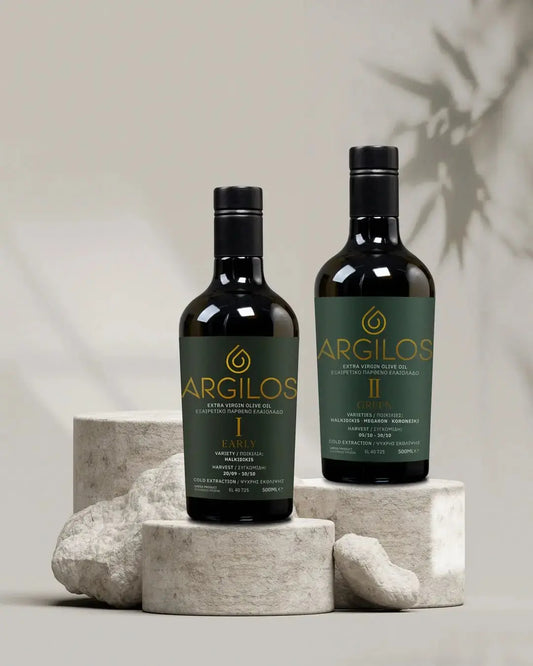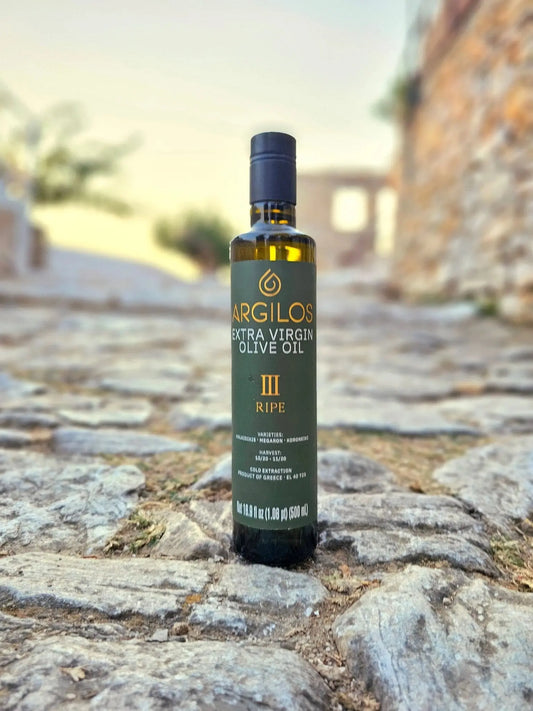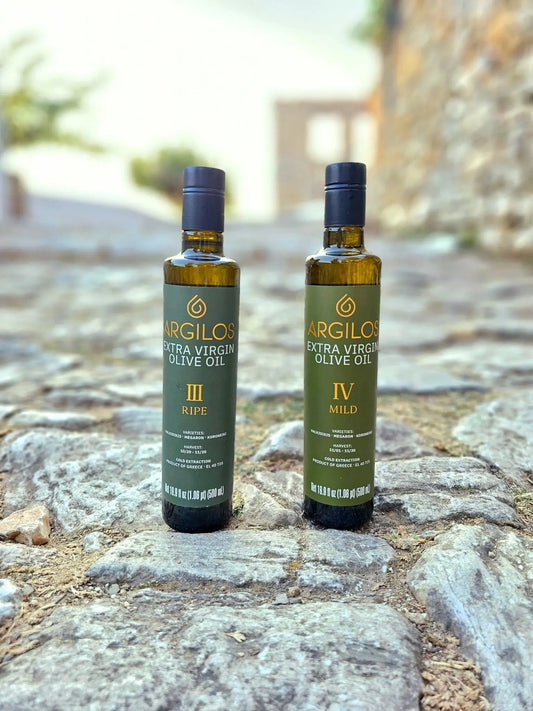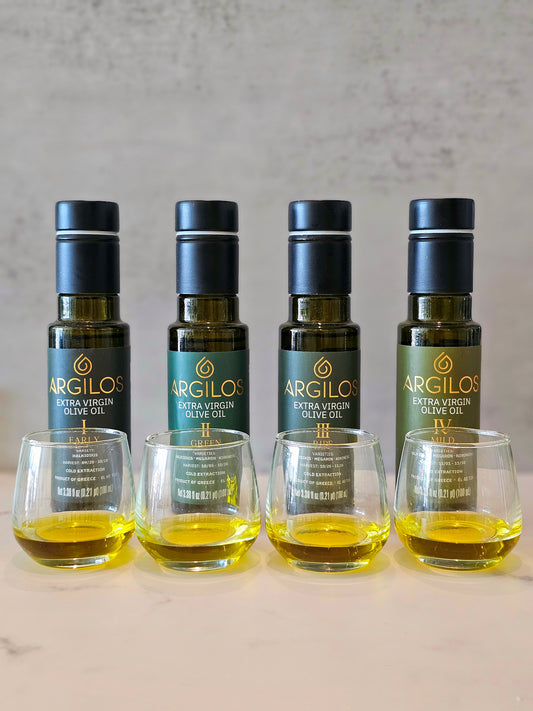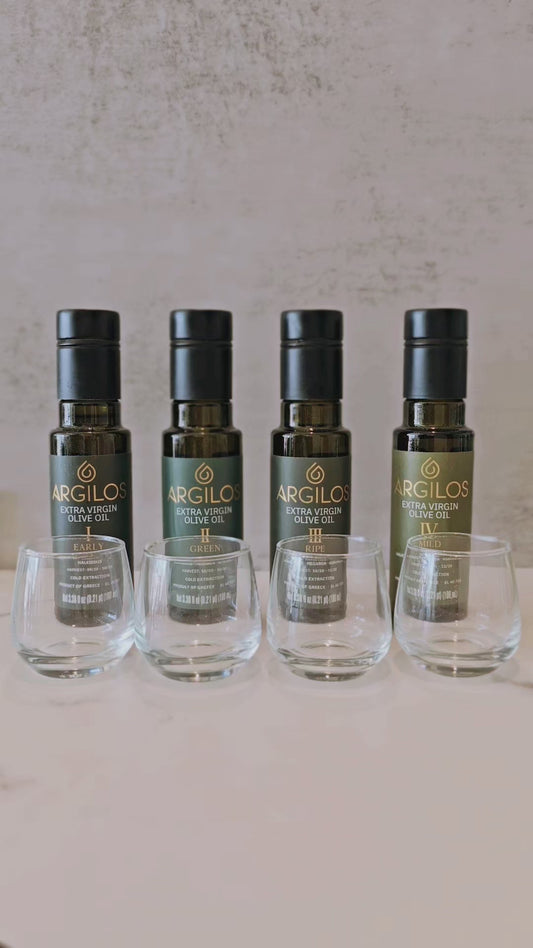Should You Drink Olive Oil at Night or in the Morning? Benefits & Best Practices
Share
Key Takeaways
- Timing Matters, But Consistency Matters More: While both morning and evening consumption offer unique benefits, regular daily intake of high-quality extra virgin olive oil is more important than perfect timing.
- Morning Benefits: Taking 1-2 tablespoons of EVOO in the morning can boost metabolism, enhance energy levels, improve appetite control, and support better nutrient absorption throughout the day.
- Evening Benefits: Nighttime consumption (1-2 hours before bed) supports overnight cellular repair, reduces inflammation, aids digestion, and may improve sleep quality.
- Personal Choice: Your ideal timing depends on digestive tolerance, lifestyle, health goals, and individual preferences rather than universal rules.
- Quality is King: Only extra virgin olive oil provides the full spectrum of health benefits—refined oils lack the beneficial antioxidants and polyphenols that make olive oil therapeutic.
- Dosage Guidelines: Research supports 1-4 tablespoons daily, starting with 1 tablespoon and gradually increasing based on tolerance and health objectives.
Olive oil has been a cornerstone of healthy eating for thousands of years, particularly in Mediterranean cultures known for their longevity and low rates of chronic disease. While most people use olive oil for cooking, an increasing number of health-conscious individuals are consuming it directly as a daily supplement. This practice raises an important question: does the timing of olive oil consumption matter for maximizing its health benefits?
The timing of when you consume olive oil can influence how your body absorbs its beneficial compounds, processes its nutrients, and responds to its therapeutic properties. This comprehensive guide examines the scientific evidence behind morning versus evening olive oil consumption, helping you make an informed decision about when to incorporate this liquid gold into your daily routine for optimal health benefits.
Understanding Olive Oil: Types and Quality
Not all olive oils are created equal, and understanding the differences is crucial for maximizing health benefits. Extra Virgin Olive Oil (EVOO) represents the highest quality grade, extracted through mechanical means without heat or chemicals. This cold-pressing process preserves the oil's natural antioxidants, polyphenols, and bioactive compounds that contribute to its therapeutic properties.

The hierarchy of olive oil quality includes:
- Extra Virgin Olive Oil (EVOO): Highest quality with superior taste, aroma, and health benefits
- Virgin Olive Oil: Good quality but with slightly higher acidity and fewer antioxidants
- Refined Olive Oil: Processed with heat and chemicals, removing many beneficial compounds
- Pomace Olive Oil: Lowest grade, extracted using solvents from olive pulp
Quality matters significantly because the health benefits associated with olive oil research primarily come from studies using high-quality EVOO. When selecting olive oil, look for dark glass bottles or tins that protect against light exposure, harvest dates within the past year, and third-party certifications. Store your olive oil in a cool, dark place away from heat sources to preserve its beneficial compounds and prevent rancidity.
General Health Benefits of Olive Oil
Scientific research has extensively documented olive oil's impressive health benefits, making it one of the most studied dietary fats. Understanding these general benefits provides context for why timing might matter in maximizing their effectiveness.
-
Cardiovascular Protection and Cholesterol Management: Olive oil's monounsaturated fats, particularly oleic acid, help reduce LDL (bad) cholesterol while maintaining or increasing HDL (good) cholesterol levels. The polyphenols in EVOO also protect against oxidative stress that can damage blood vessels and contribute to heart disease.
-
Anti-inflammatory and Antioxidant Effects: Olive oil contains powerful antioxidants including vitamin E, polyphenols, and oleocanthal—a compound with anti-inflammatory properties similar to ibuprofen. These compounds help combat chronic inflammation, which underlies many age-related diseases.
-
Digestive System Support and Skin Health: The healthy fats in olive oil support the absorption of fat-soluble vitamins (A, D, E, K) and help maintain the integrity of cell membranes throughout the digestive tract. Additionally, olive oil's antioxidants contribute to skin health from the inside out.
-
Longevity and Chronic Disease Prevention: Population studies consistently show that people following Mediterranean diets rich in olive oil have lower rates of cardiovascular disease, certain cancers, and neurodegenerative conditions. The combination of healthy fats and bioactive compounds appears to support cellular health and longevity.
The extensive body of research supporting these benefits comes from both observational studies of Mediterranean populations and controlled clinical trials, providing robust evidence for olive oil's role in promoting health and preventing disease.
The Science Behind Timing: Morning vs. Night Consumption
Understanding how our bodies process nutrients throughout the day provides insight into why timing might matter for olive oil consumption. Our circadian rhythms—the internal biological clocks that regulate various physiological processes—influence everything from hormone production to digestive enzyme activity.
During the morning hours, our metabolism naturally increases as cortisol levels rise and our bodies prepare for the day's activities. This metabolic awakening may enhance the absorption and utilization of olive oil's beneficial compounds. Additionally, taking olive oil on an empty stomach in the morning may allow for better absorption of fat-soluble vitamins and polyphenols without competition from other foods.
Evening consumption, on the other hand, aligns with our body's natural repair and recovery processes that occur during sleep. The anti-inflammatory compounds in olive oil may be particularly beneficial during nighttime hours when cellular repair and regeneration are most active. However, some people may experience digestive discomfort when consuming fats close to bedtime.
Current research on timing-specific effects of olive oil consumption is limited, with most studies focusing on daily intake rather than optimal timing. This gap in research means that recommendations often rely on understanding general principles of nutrient absorption and circadian biology rather than specific olive oil timing studies. Individual factors such as digestive sensitivity, lifestyle patterns, and health goals may ultimately be more important than adhering to rigid timing rules.
Benefits of Taking Olive Oil in the Morning
Morning consumption of olive oil offers several potential advantages that align with your body's natural rhythms and daily needs. Starting your day with a tablespoon or two of high-quality EVOO can provide sustained energy and set a healthy tone for your entire day.
-
Metabolism Boost and Energy Production: Taking olive oil in the morning can help kickstart your metabolism as the healthy monounsaturated fats provide a steady source of energy. Unlike simple carbohydrates that cause blood sugar spikes and crashes, the fats in olive oil provide sustained energy release throughout the morning hours.
-
Improved Digestion and Nutrient Absorption: Consuming olive oil on an empty stomach may enhance the absorption of its beneficial compounds, including antioxidants and fat-soluble vitamins. The oil can also stimulate bile production, which aids in the digestion of fats consumed throughout the day.
-
Appetite Control and Blood Sugar Regulation: The healthy fats in olive oil can help you feel satisfied longer, potentially reducing cravings for less healthy foods later in the day. This satiety effect can support weight management goals and help stabilize blood sugar levels.
-
Cognitive Alertness and Anti-inflammatory Effects: The antioxidants in olive oil, particularly oleocanthal, begin working immediately to combat inflammation. Starting your day with these anti-inflammatory compounds may support cognitive function and overall well-being throughout the day.
For morning consumption, take 1-2 tablespoons of EVOO either alone or mixed with a small amount of lemon juice. Take it immediately upon waking or with a light breakfast. Some people prefer to follow it with a glass of warm water to aid digestion.
Benefits of Taking Olive Oil at Night
Evening consumption of olive oil can support your body's natural overnight repair and recovery processes. While morning intake focuses on preparing your body for the day ahead, nighttime consumption works with your body's circadian rhythms to optimize healing and regeneration.
-
Enhanced Digestion and Reduced Gastrointestinal Discomfort: Taking olive oil 1-2 hours before bed can help soothe the digestive system and may reduce overnight acid reflux or digestive discomfort. The oil's anti-inflammatory properties can help calm irritated digestive tissues.
-
Anti-inflammatory and Cellular Repair Support: Nighttime is when your body performs most of its cellular repair work. The antioxidants and anti-inflammatory compounds in olive oil can support these natural healing processes, potentially enhancing recovery from daily oxidative stress.
-
Sleep Quality and Relaxation: Some people report improved sleep quality when taking olive oil before bed, possibly due to its satiating effects preventing hunger-related sleep disruptions and its role in supporting overall cellular health.
-
Overnight Skin Repair and Blood Sugar Stabilization: The healthy fats in olive oil support skin cell regeneration during sleep, while also helping to maintain stable blood sugar levels throughout the night, which can improve sleep quality and morning energy levels.
For evening consumption, take 1-2 tablespoons of EVOO about 1-2 hours before bedtime. This timing allows for initial digestion while still providing benefits during sleep. You can take it alone, mix it with herbal tea, or incorporate it into a light evening snack.
Comparing Morning and Night Intake: Which Should You Choose?

The choice between morning and evening olive oil consumption ultimately depends on your individual health goals, lifestyle, and digestive tolerance. Rather than viewing this as an either-or decision, consider your personal circumstances and preferences.
|
Aspect |
Morning Consumption |
Evening Consumption |
|
Primary Benefits |
Energy boost, metabolism enhancement, appetite control |
Overnight repair, digestive comfort, sleep quality |
|
Best For |
Weight management, busy schedules, morning routines |
Inflammation reduction, digestive issues, recovery focus |
|
Absorption |
Enhanced on empty stomach |
Good with lighter evening meals |
|
Energy Impact |
Sustained energy throughout day |
Supports restful sleep and recovery |
|
Digestive Timing |
May cause sensitivity in some people |
Generally gentler, 1-2 hours before bed |
|
Metabolic Effects |
Kickstarts daily metabolism |
Supports overnight cellular repair |
|
Ideal Candidates |
Active individuals, weight watchers |
People with digestive sensitivity, night shift workers |
Choose morning consumption if you:
- Want to boost energy and metabolism for the day
- Have good digestive tolerance on an empty stomach
- Aim to control appetite and support weight management
- Prefer establishing a consistent morning routine
Choose evening consumption if you:
- Experience digestive sensitivity in the morning
- Want to support overnight repair and recovery
- Have difficulty sleeping due to hunger
- Focus on anti-inflammatory benefits during rest
Factors to consider include:
- Digestive sensitivity: Some people tolerate fats better at certain times of day
- Lifestyle patterns: Your work schedule and meal timing may influence optimal consumption
- Health goals: Weight management versus inflammation reduction may favor different timing
- Sleep patterns: Evening consumption shouldn't disrupt your sleep quality
The most important factor is consistency rather than perfect timing. Regular daily consumption of high-quality olive oil will provide health benefits regardless of when you take it. Consider experimenting with both morning and evening timing for a few weeks each to determine what works best for your body and schedule.
Best Practices for Taking Olive Oil
Maximizing the benefits of olive oil consumption requires attention to dosage, quality, and consumption methods. Following evidence-based best practices ensures you receive optimal health benefits while avoiding potential side effects.
Recommended dosage: Most research supports 1-4 tablespoons (15-60ml) of EVOO daily for health benefits. Start with 1 tablespoon and gradually increase based on tolerance. This amount provides significant antioxidants and healthy fats without excessive calories.
Consumption methods:
- Take alone as a "shot" followed by water or herbal tea
- Mix with fresh lemon juice for enhanced absorption and palatability • Drizzle over fresh vegetables or incorporate into meals
- Blend into smoothies or yogurt for easier consumption
Quality considerations: Always choose certified extra virgin olive oil from reputable producers. Look for harvest dates, proper storage in dark containers, and third-party quality certifications. Poor quality oils won't provide the same health benefits and may even be harmful.
Combining with other nutrients: Olive oil enhances the absorption of fat-soluble vitamins, so consider taking it with vitamin D supplements or eating it with colorful vegetables rich in carotenoids.
Common mistakes to avoid: Don't heat olive oil to high temperatures when cooking, as this destroys beneficial compounds. Avoid taking excessive amounts, which can cause digestive upset and unnecessary calories. Don't substitute olive oil for a balanced diet—it should complement, not replace, other healthy foods.
Safety, Side Effects, and Precautions
While olive oil is generally safe for most people, understanding potential side effects and precautions ensures responsible consumption. Being aware of these considerations helps you maximize benefits while minimizing risks.
Possible digestive effects: Some people may experience mild digestive upset, particularly when first starting or when consuming large amounts. Symptoms can include nausea, diarrhea, or stomach discomfort. Starting with smaller doses and gradually increasing can help minimize these effects.
Medication interactions: Olive oil may enhance the absorption of certain medications, particularly fat-soluble drugs. If you take prescription medications, especially blood thinners or diabetes medications, consult your healthcare provider before adding significant amounts of olive oil to your routine.
Caloric considerations: Olive oil is calorie-dense at about 120 calories per tablespoon. While the calories come from healthy fats, they still count toward your daily energy intake. Factor this into your overall dietary planning to maintain a healthy weight.
Special populations: Pregnant and nursing women, children, and people with gallbladder disease should consult healthcare providers before consuming therapeutic amounts of olive oil. People with severe digestive conditions may need modified approaches.
When to seek medical advice: Contact a healthcare provider if you experience persistent digestive upset, unusual symptoms after consumption, or if you have concerns about interactions with existing health conditions or medications.
Quality and moderation remain key to safe consumption. High-quality EVOO taken in recommended amounts is considered very safe for most healthy adults.
Conclusion: Maximizing Benefits While Minimizing Risks
The timing of olive oil consumption—whether morning or evening—is less important than the consistency and quality of your daily intake. Both timing options offer unique benefits that align with different health goals and lifestyle preferences. Morning consumption may better support energy, metabolism, and appetite control, while evening intake can enhance overnight repair and digestive comfort.
The key to maximizing olive oil's health benefits lies in choosing high-quality extra virgin olive oil, consuming it consistently at whatever time works best for your schedule and digestive tolerance, and maintaining appropriate dosages of 1-4 tablespoons daily. Listen to your body's responses and adjust timing and amount accordingly.
Remember that olive oil is most beneficial as part of an overall healthy diet and lifestyle, not as a standalone solution. Focus on incorporating it consistently into your routine, whether that's first thing in the morning or as part of your evening wind-down ritual. The antioxidants, healthy fats, and anti-inflammatory compounds will support your health regardless of when you consume them.
Quality, consistency, and moderation should guide your olive oil consumption more than rigid timing rules. Start with what feels sustainable for your lifestyle, and don't hesitate to experiment to find your optimal routine.
Frequently Asked Questions (FAQs)
Q: Is morning better than night for olive oil consumption?
Neither timing is definitively better—both offer unique benefits. Morning consumption may boost energy and metabolism, while evening intake supports overnight repair. Choose based on your goals and tolerance.
Q: What is extra virgin olive oil and why does quality matter?
Extra virgin olive oil is the highest grade, cold-pressed without chemicals or heat. Quality matters because only high-grade oils retain the beneficial antioxidants and polyphenols responsible for health benefits.
Q: What are the different health benefits by timing?
Morning intake may enhance energy, metabolism, and appetite control. Evening consumption can support digestion, sleep quality, and overnight cellular repair processes.
Q: How does olive oil compare to other oils for metabolism?
Olive oil's monounsaturated fats provide more stable energy than saturated fats and contain unique antioxidants not found in most other oils, making it superior for metabolic health.
Q: How much olive oil should I take daily?
Research supports 1-4 tablespoons (15-60ml) daily. Start with 1 tablespoon and increase gradually based on tolerance and health goals.
Q: Can I take olive oil on an empty stomach?
Yes, many people tolerate olive oil well on an empty stomach and may experience better absorption. If you experience discomfort, try taking it with a small amount of food.
References
-
Estruch, R., Ros, E., Salas-Salvadó, J., et al. (2018). Primary prevention of cardiovascular disease with a Mediterranean diet supplemented with extra-virgin olive oil or nuts. New England Journal of Medicine, 378(25), e34.
-
Foscolou, A., Critselis, E., & Panagiotakos, D. (2018). Olive oil consumption and human health: A narrative review. Maturitas, 118, 60-66.
-
Beauchamp, G. K., Keast, R. S., Morel, D., et al. (2005). Phytochemistry: ibuprofen-like activity in extra-virgin olive oil. Nature, 437(7055), 45-46.
-
Schwingshackl, L., Lampousi, A. M., Portillo, M. P., et al. (2018). Olive oil in the prevention and management of type 2 diabetes mellitus: a systematic review and meta-analysis of cohort studies and intervention trials. Nutrition & Diabetes, 7(4), e262.
-
Covas, M. I., Nyyssönen, K., Poulsen, H. E., et al. (2006). The effect of polyphenols in olive oil on heart disease risk factors: a randomized trial. Annals of Internal Medicine, 145(5), 333-341.
-
International Olive Council. (2019). World olive oil figures. Retrieved from https://www.internationaloliveoil.org/
-
Visioli, F., & Galli, C. (2002). Biological properties of olive oil phytochemicals. Critical Reviews in Food Science and Nutrition, 42(3), 209-221.
-
Waterman, E., & Lockwood, B. (2007). Active components and clinical applications of olive oil. Alternative Medicine Review, 12(4), 331-342.
Disclaimer: This article is for educational purposes only and should not replace professional medical advice. The use of olive oil has not been evaluated by the FDA for treating, curing, or preventing any disease. Individual results may vary, and it's important to consult with healthcare providers before making significant dietary changes, especially if you have existing health conditions or take medications.

